BLOG ARTICLE
How to Create a Podcast Marketing Calendar ( + Free Template)
Last updated: 7/26/2024
Last updated: 7/26/2024
What's a Podcast Marketing Calendar?
A podcast marketing calendar is a schedule or plan that outlines activities for promoting your podcast over a specific period - usually a month or a quarter. It's a series of detailed actions to help you organize and track your podcast marketing efforts, including social media posts and repurposing, podcast email newsletters, reaching out and guest appearances, advertising campaigns, and any other podcast best practices to promote your show.
Here's an example of a podcast marketing calendar:

A podcast marketing calendar can help you across all the stages of your podcast promotion; from social media posts, email marketing, guest appearances, content partnership (cross-promotion), SEO optimization, or podcast advertising.
You need a podcast marketing calendar in your workflow if;
- You want to promote your podcast effectively
- You want to stay organized and consistent with your promotional efforts
Having this calendar can lead to consistent promotional efforts that can help you reach a wider audience and funnel traffic to your show.
Now, how can you create one?
How to Create a Podcast Marketing Calendar - 3 Steps
In five steps, we will walk you through how to create your marketing template (which you can use again) and how to find, plan, and publish your marketing content.
Step 1 - Start With a Template
A template means you don't have to create your podcast marketing calendar from scratch. Depending on your podcast marketing goals, your calendar might need specific information tailored to your goals. For example, a podcaster who wants to grow his show with SEO might have a column on his template titled “primary keyword” while a podcaster focusing on social media might not have that.
However, here is some general information on what your template should contain;
- The link to the episode (or audio file)
- Episode release date
- Marketing channels (SEO, social media, paid advertising, cross-promotion, etc)
- Promotional assets (podcast clips, audiograms, quote images)
- Social media post schedule
Each podcast marketing calendar will look different depending on the marketing goals.
Here are some information to include for popular podcast marketing goals;
SEO goals
- Primary keyword (+ search volume)
- Title and meta description (blog post)
- Featured image
- Content promotion
Social media goals
- Social media channels (Facebook, Instagram, YouTube, TikTok, etc)
- Captions
- Hashtags
- Posts schedules
- Tagged users
- Promotional assets (clips, audiograms, images)
Cross-promotion goals
- Guest selection
- Outreach schedule
- Collaborative episodes
- Social media promotion
These information aren't fixed rules. Depending on your goals, they can be changed, renamed, or removed.
We have a free podcast marketing calendar template containing essential information that you need and the freedom to add other details.
However, (unless you're a solo podcaster) having a template for your marketing calendar isn't the end. You will need to share it with your podcast team, VA assistant, or anyone who'll collaborate with you on it.
To prevent any error or mistake, you will need to create a document on how this podcast calendar will work and how to use it. This will help when onboarding new employees, virtual assistants, or collaborators.
Step 2: Plan Your Podcast Content
As podcasters, one of the things that accelerate your podcast marketing is choosing the right topics to cover in your show. By this, we mean not just any topic that you come up with under the shower but topics that are trending and your audiences want. Plus, by incorporating relevant keywords into your content, your podcast will show up on search engines, attracting new listeners organically.
Your topics should check the following boxes;
- The topics interest you and align with your passion, expertise, and your niche
- Resonate with your audiences and have high demand in search engines, including Google and Youtube
- Have lower search volume but also low competition
These boxes aren't the hallmark of what your topics should entail but to have consistent listens, clicks, and downloads on your show, your topics must check at least two of these boxes.
You can use Podsqueeze free podcast topic generator to get topic ideas but also analyze their performance in terms of demand and competition, helping you plan your content strategy.
Check out the tool and type in your podcast niche.
In this example we are going to use “content marketing.”
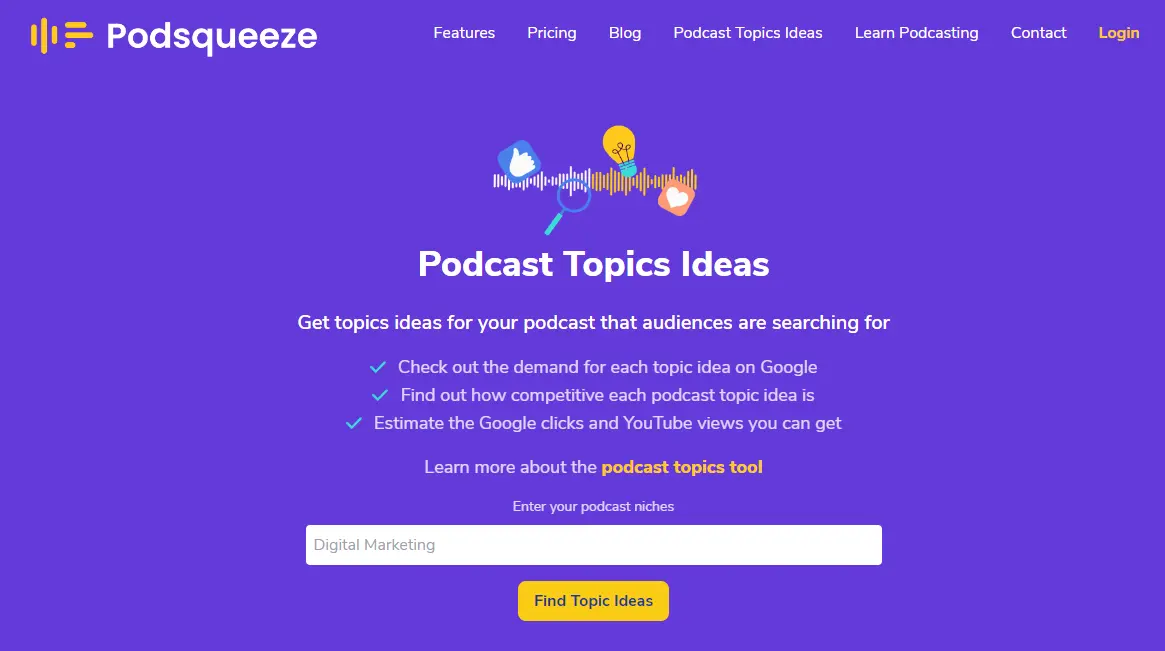
Then click “Find topic ideas.”
From your results, you'll see different results, each row representing a topic idea for the niche you searched.
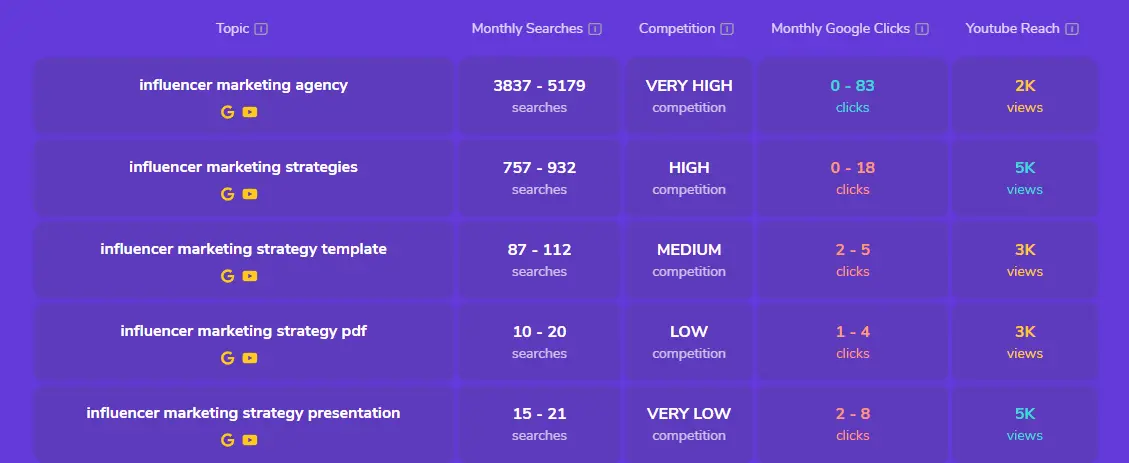
You can browse through the topics to see them;
- Monthly searches
- Competition
- Monthly Google clicks
- YouTube reach

A question that often ensues in this stage is; What topics should I choose?
The answer depends on your marketing goal. However, in general, newer websites and small podcasts should focus on covering topics with very low to low competition. This approach significantly increases the chances of ranking in search engines.
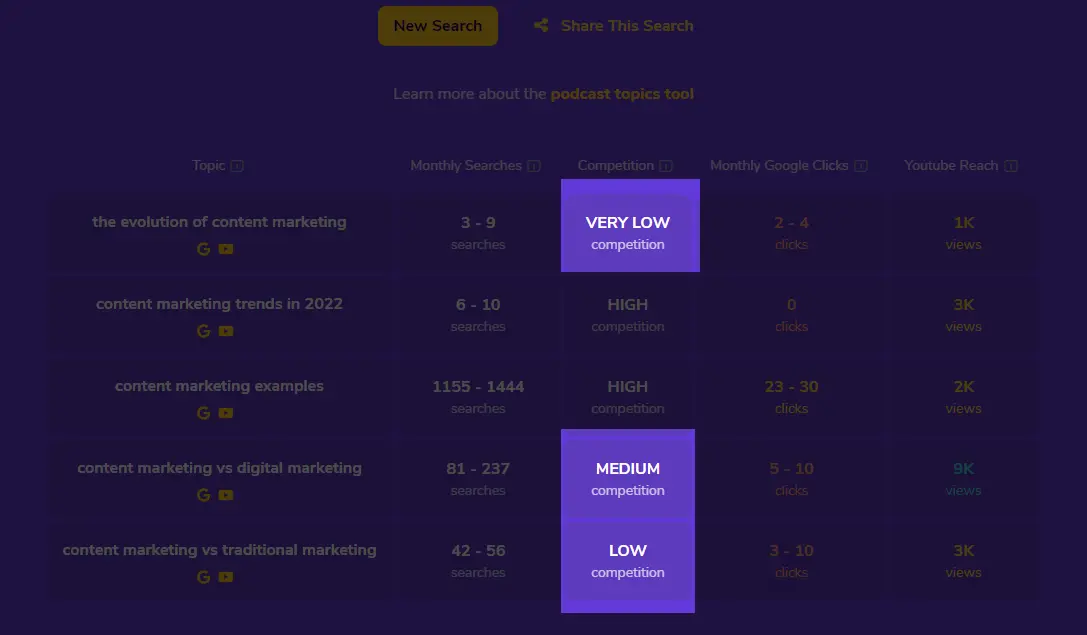
On the other hand, if you're looking to create engaging content for social media and YouTube, you might want to choose topics with high YouTube views and high search volume. This indicates that the content can easily appeal to a wider audience.
Tip: Your podcast marketing success hangs on the feasibility and uniqueness of your podcast content calendar and choosing the right topic is key. This way, it is easier to market a podcast episode that people are interested in than topics that are not relevant to your audiences.
Step 3: Publish Your Marketing Assets
Start publishing the marketing assets - podcast clips, audiograms, quote images, and other social media posts - or schedule them to publish ahead of time.
Tip: You can generate your podcast marketing assets (podcast clips, audiograms, quote images, and other social media posts) for free with Podsqueeze, an AI copilot for your podcast.
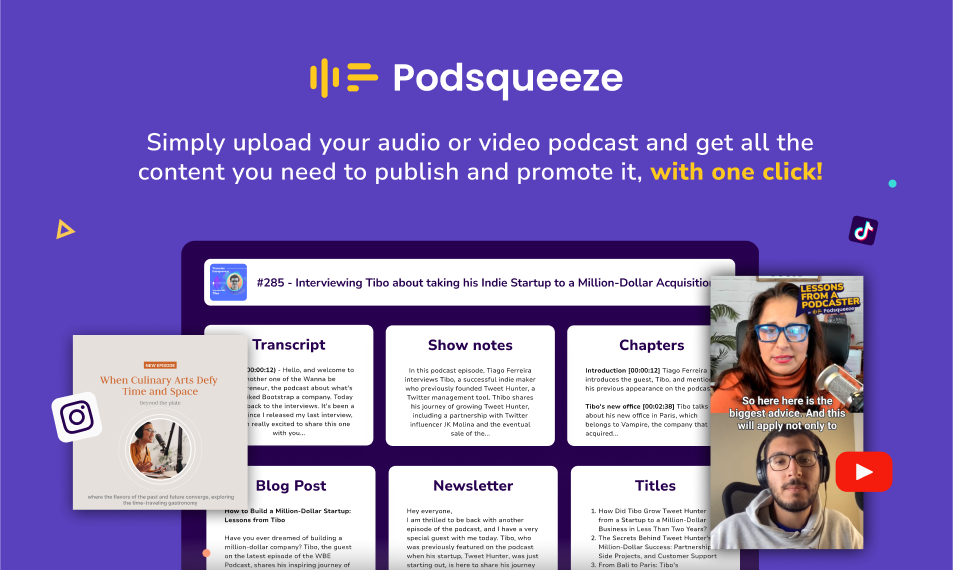
For solo podcasters with limited time, you can invest in some free scheduling tools to streamline publishing your content across social media.
- Buffer
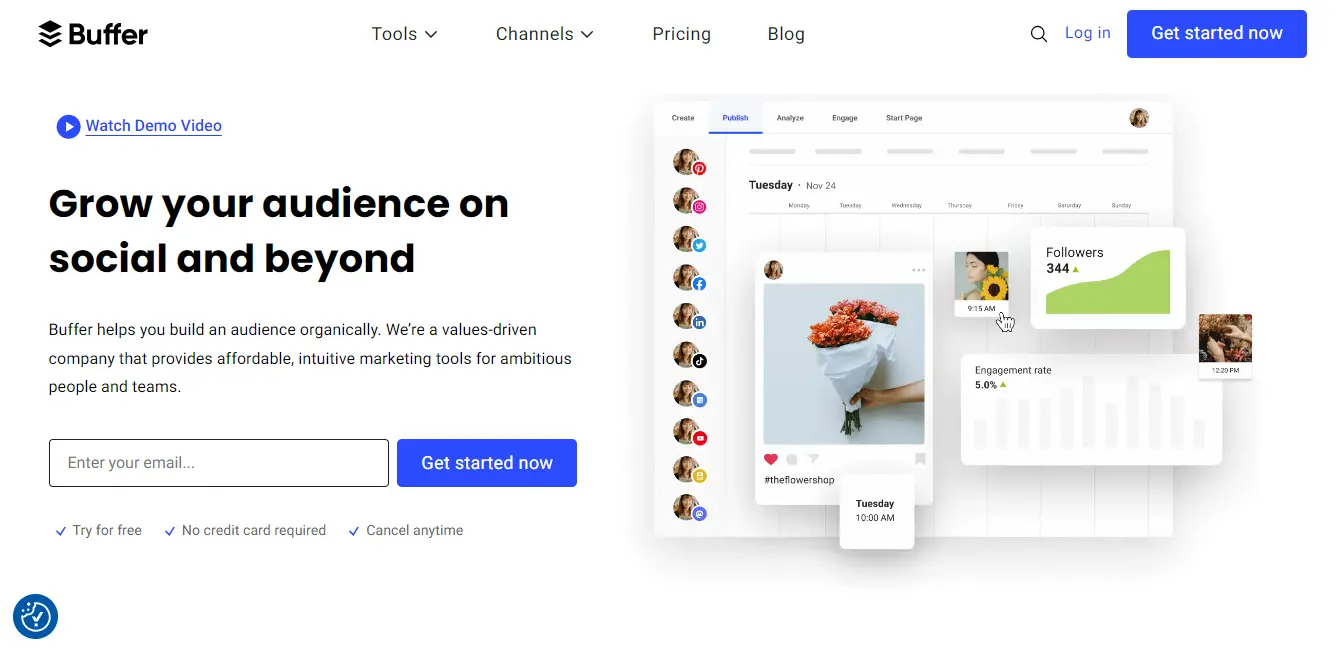
- Coschedule
- Hootsuite
- Sprout Social
- Later
These are a combination of free and paid tools (can be used by podcast teams). They can maximize your marketing effort and save you time which can be used on other important aspects of your work or life.
The Best Podcast Marketing Calendar Tools
There are many free and paid podcast marketing calendar tools. Some are more tailored to solo podcasters and some might work well with a podcast team.
Here are some of our favorites with a template to get started.
Google Sheets (and other spreadsheet software like Microsoft Excel, Numbers, etc)
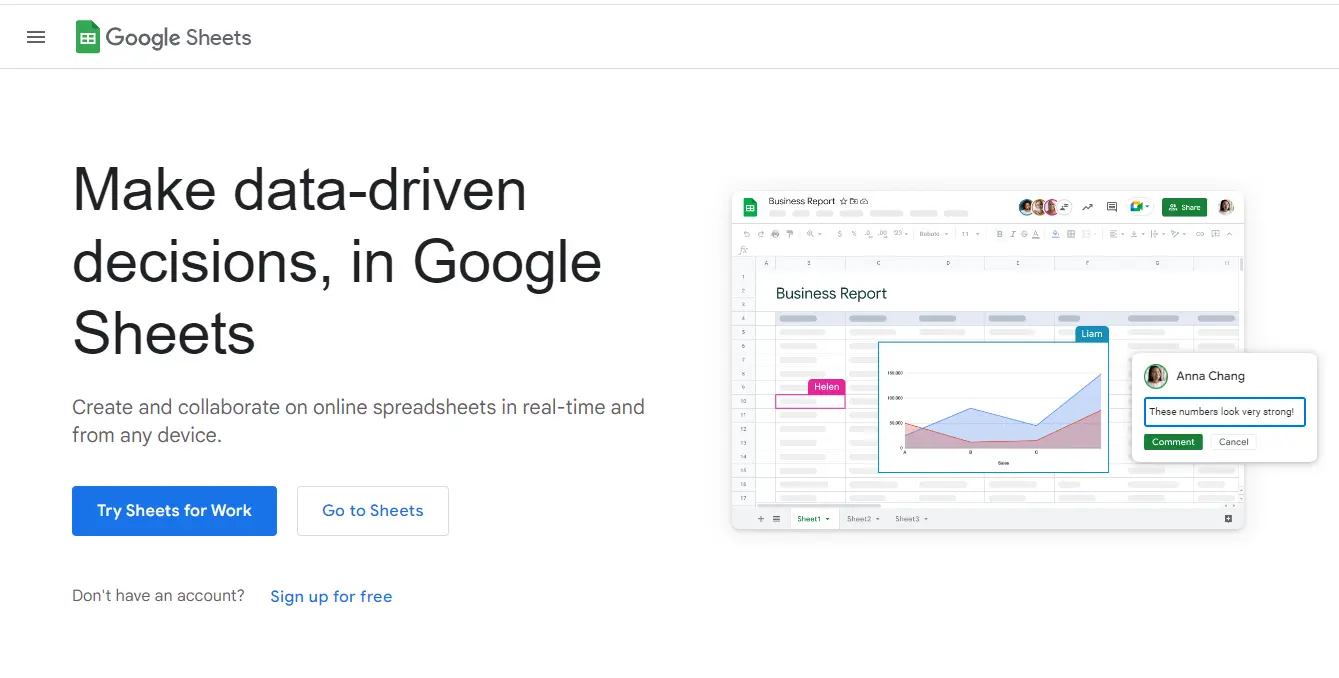
Google Sheets is a cloud-based spreadsheet program from Google that allows you to create, edit, format, and collaborate.
For solo podcasters (with a low budget) looking for intuitive easy-to-use software for creating their podcast marketing calendar, Google Sheet is a great choice.
The Sheets template attached at the beginning of this guide can also be downloaded and used to make your marketing calendar.
Notion
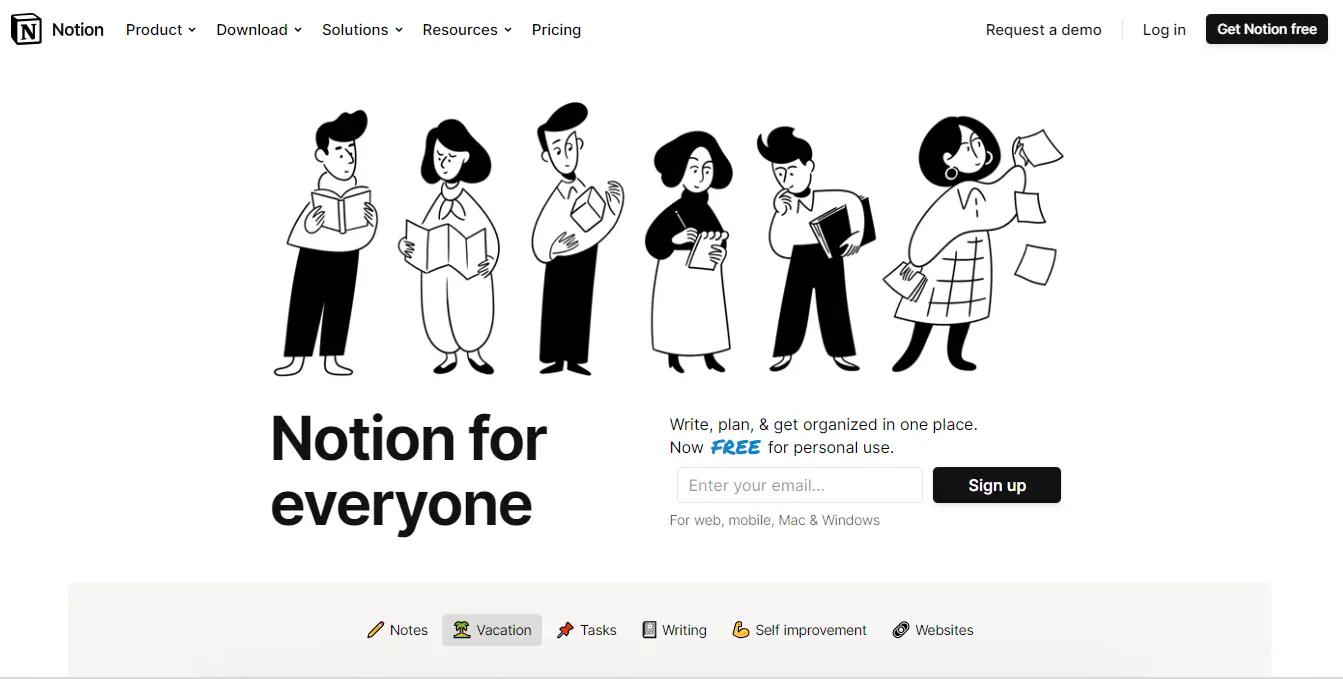
Notion is an all-in-one workspace application that combines note-taking, project management, knowledge management, and collaboration features. It's more suitable for podcast teams that want a detailed, modern, and well-designed look for their podcast marketing calendar.
It's free to use and with it, you can create and organize every detail of your podcast marketing content from notes, scripts, documents, tasks, collaborations, guest details, blogs, etc.
If you want a unified experience for your podcast content, Notion is one to check out.
Trello
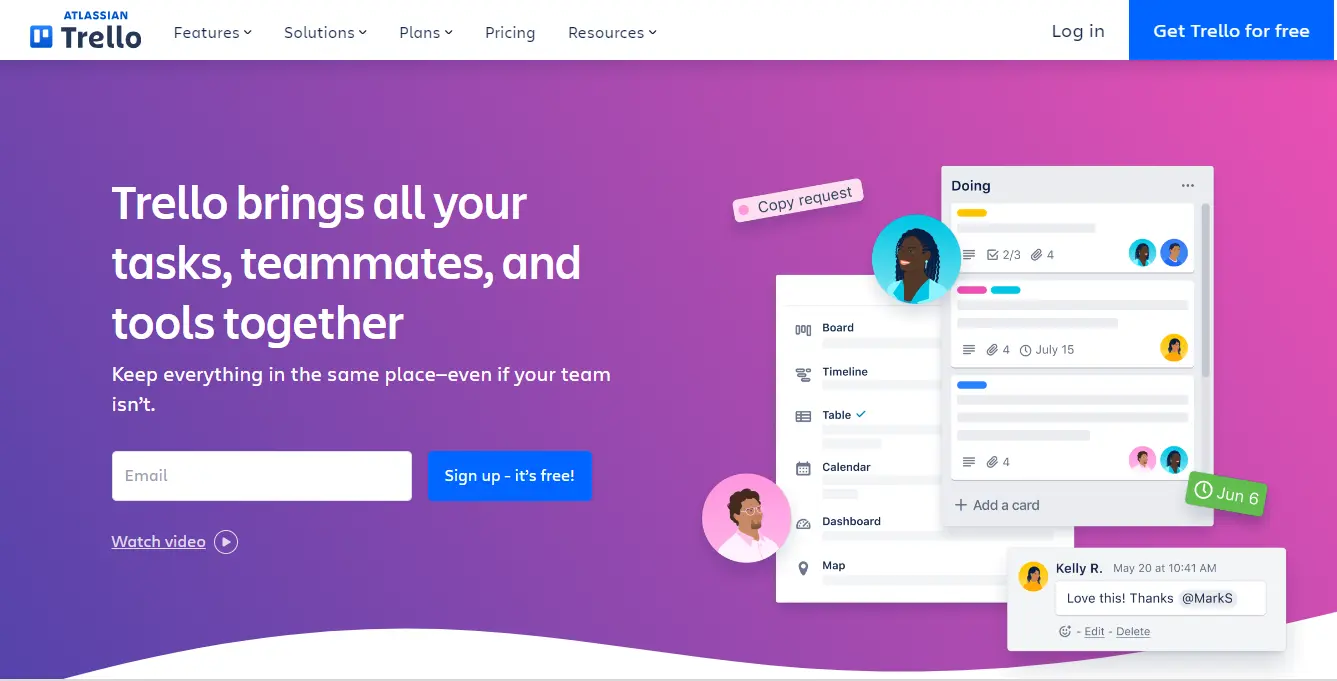
Trello is a project management web-based application that can also be used as a calendar and task manager.
You can schedule your podcast tasks for a specific date or assign them to team members and collaborators.
Trello makes use of boards, lists, and cards to organize tasks and projects. This can help you know the stages of each podcast marketing task and it's suitable for solo podcasters or podcast teams.
Asana

Asana is a web and mobile application designed to organize, manage, and track tasks and projects. It's similar to Trello in functionalities and features.
You can create a calendar for your podcast marketing and get a detailed timeline of the progress of each task. You can also visualize tasks in various formats (lists, boards, calendars, or timeline view).
It's suitable for podcast teams but solo podcasters can still have a smooth ride with it.
Best Practices For Creating a Podcast Marketing Calendar
Let it Align With Your Podcast Goals
Your podcast marketing calendar should align with what you want your podcast to achieve. For example, if your podcast goal is to get ranked on search engines, your calendar needs to focus on podcast SEO best practices that can help achieve such goal - like optimizing your description, creating a podcast landing page, repurposing your podcast episodes into blogs, keyword/topic research, creating a link-in-bio for your podcast profile, transcriptions, etc.
Some other goals could be increasing listenership, expanding audience reach, or promoting specific episodes or topics. The idea here is to align your podcast marketing calendar as a driver to achieve your podcast goal(s).
Your goal(s) should be realistic and have a timeframe for it to be achieved. This timeframe can then be used to decide the duration of your podcast marketing calendar.
Typically, you want to start with a timeframe that's not too far into the future. Two months to six months is ideal. After the timeframe has elapsed, measure and analyze the growth, changes, and developments made during the time and align your approach moving forward.
Understand your audiences to the core
There's a big difference between knowing your audiences and understanding them to the core.
To effectively tailor your marketing efforts, you need to know what your audiences want, how they want it, where they want it, and how much they want it.
For example, if your podcast goal is to increase listenership through social media, you'll need to know where your audiences hang out, how they do, when they do, and how they react.
By understanding their preferences, interests, and behaviors, you can tailor your marketing effort to resonate with them and also attract new listeners.
Identify key dates in your niche
After understanding your audiences, you'll notice some dates that are relevant to your niche, your audiences, and your podcast theme.
For example, if your podcast audiences are working mums, you want to keep in mind dates like Mother's Day, Children's Day, International Women's Day, Family holidays like Thanksgiving, Christmas, and Halloween, etc.
Identify relevant dates, events, holidays, or milestones that align with your podcast niche or content theme. Then incorporate these dates into your podcast marketing calendar to share relevant content that can drive timely traffic.
Focus on one marketing channel
It's so easy to get hung up on incorporating multiple marketing channels into your calendar. As much as this isn't entirely a bad idea, you need to define one marketing channel to focus your marketing efforts on.
Here are some marketing channels to consider;
- Social media
- Email newsletters
- Podcast aggregators
- SEO
- Cross-promotion
- Podcast advertisers
- Events or Webinar
You will always use more than one channel to promote your podcast but it's important to focus more on one channel specifically for scaling your show.
Audit, rinse, and repeat
Before now, you've probably shared some Facebook posts, YouTube videos, LinkedIn posts, Instagram reels, carousels or Twitter updates.
Look back on these posts from the different socials and find what has worked.
- Are there any posts that people reacted to differently?
- What is your best-performing content on each platform?
- Have you used polls, questions, hashtags, and tags that increase your content reach?
You're finding what has worked in the past to recreate them again in a more refined manner. That's why this section is called audit, rinse, and repeat.
After identifying popular content from your previous marketing efforts up to this point, think about what you can add, subtract, or enhance to make it better, and then incorporate these findings into your podcast marketing efforts moving forward.
Start Filling Your Podcast Marketing Calendar
As you can see, a podcast marketing calendar is an easy-to-create and easy-to-use tool for managing everyday related marketing tasks for your podcast.
Behind this guide, there are other podcast marketing strategies you must plan out.
Learn more about podcast marketing strategy with these in-depth guides;
- Podcast Marketing Strategy
- Complete Guide on Audiograms and Podcast Clips
- Email Marketing for Podcast
- Social Media Strategy fo Your Podcast
And if you're ready to start working on your podcast marketing strategy, check out Podsqueeze podcast marketing assets generator.
Repurpose your podcast content with AI